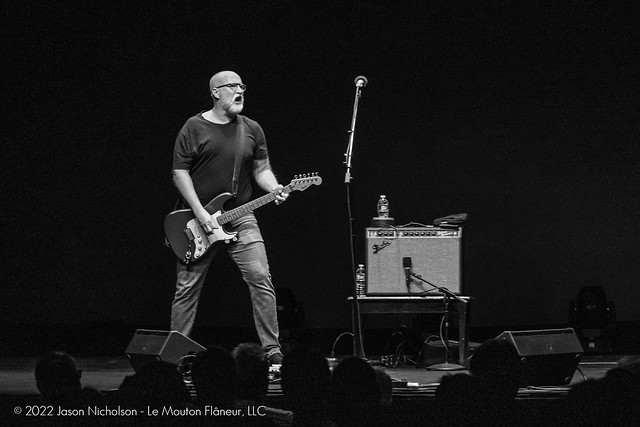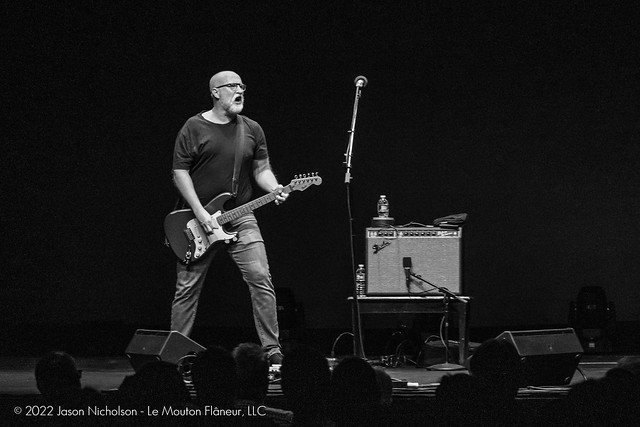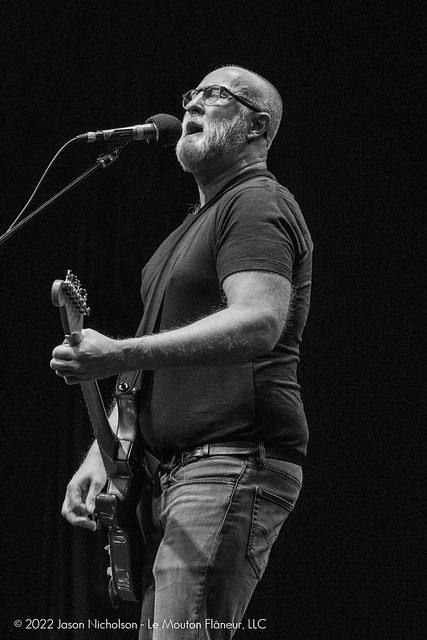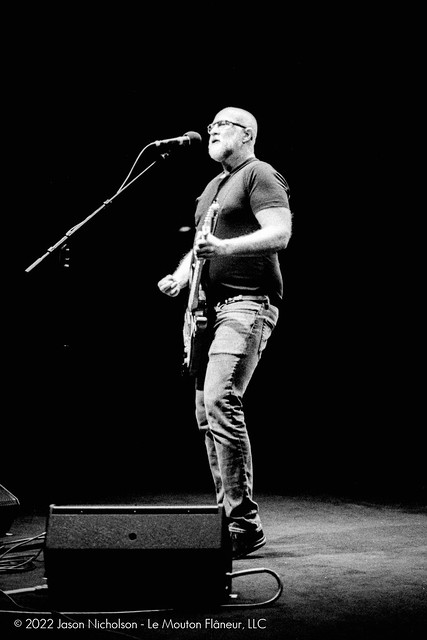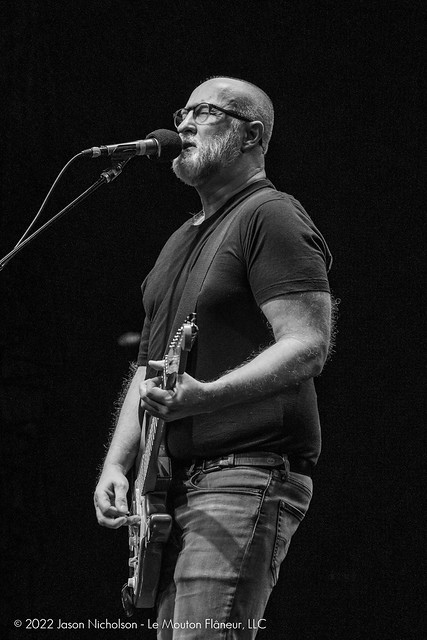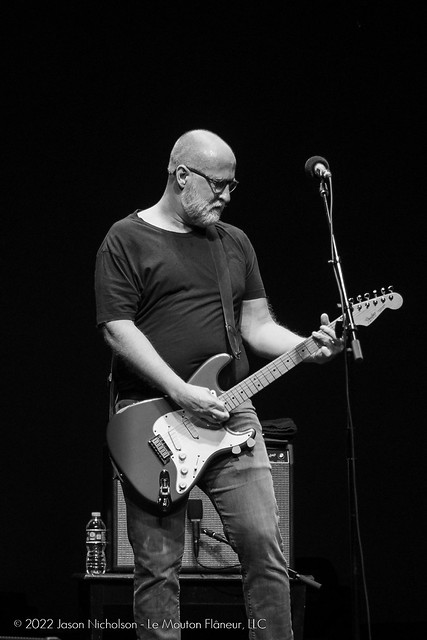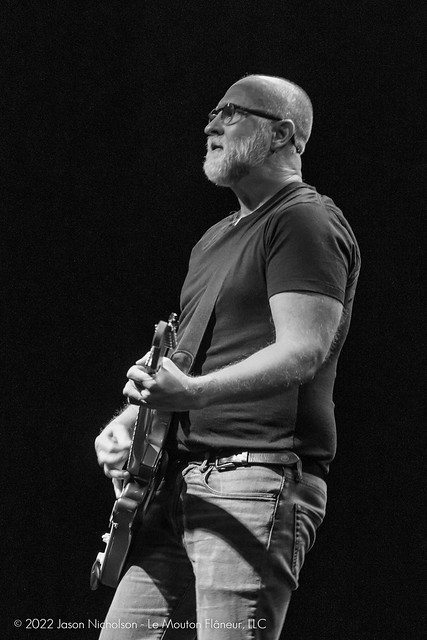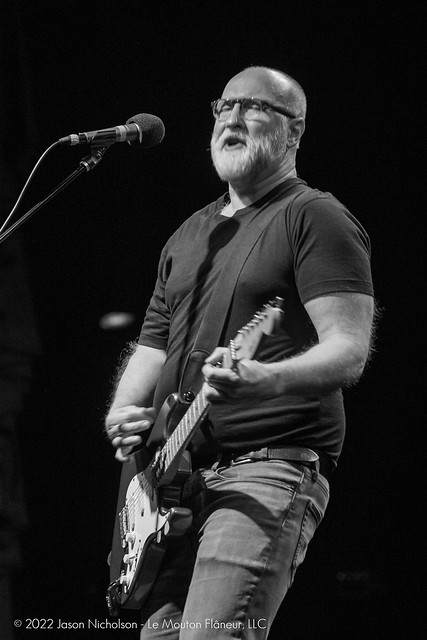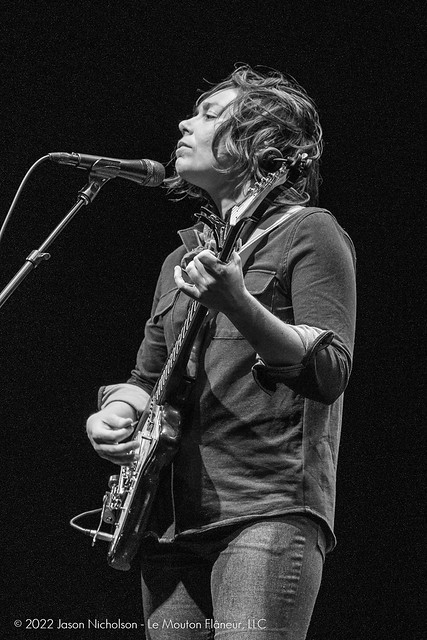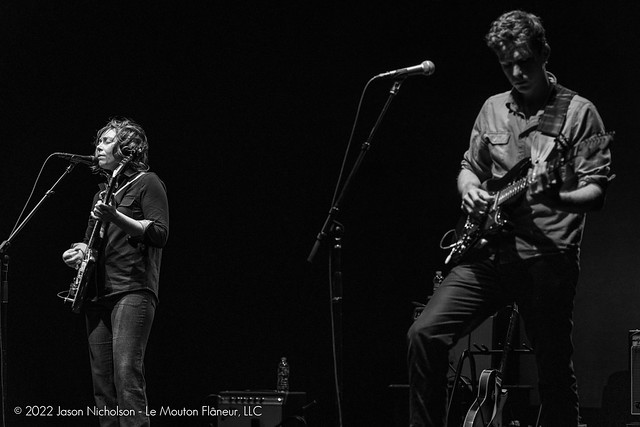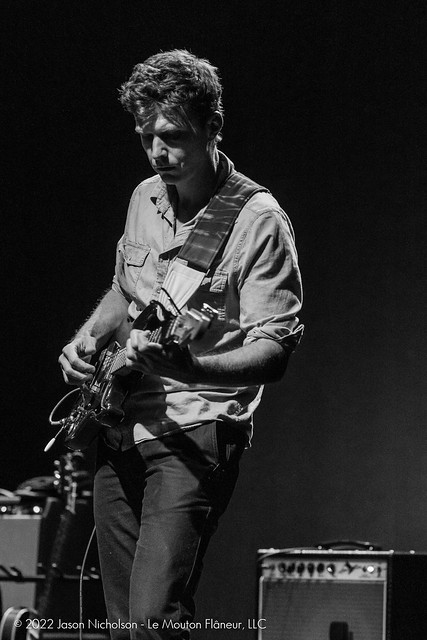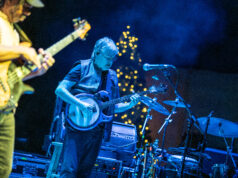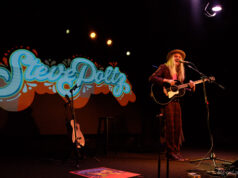Bob Mould performs at The Barns at Wolf Trap on Oct. 19, 2022. (Photos by Jason Nicholson)
Bob Mould introduced himself — just in case anyone recently attending The Barns at Wolf Trap didn’t already know — as “a 62-year-old gay man.” For a man in his seventh decade of life, and his fifth as a working musician, he brings incredible energy to the stage. He’s admitted to not having the same physicality as he did at the start of his career, with the pathbreaking hardcore/alternative band Husker Du, but he’s still more kinetic than most artists.
As aggressive as his guitar attack and snarling vocals are, Bob is equally a gentle, kind person. At Wolf Trap on Oct. 19, in the moments when he talked to the crowd between songs, Bob spoke with a soft — not quiet, but soft — Rust Belt-inflected voice, and he couldn’t have been nicer when he met with fans after the show. I have a lot of respect for Bob as someone who’s accomplished a great deal, but who remains very grounded, very salt-of-the-earth. Forgive me for bringing up a cliche, but while it’s nice to be great, it’s great to be nice — and Bob is both.
Mould grew up in far upstate New York before moving to the Twin Cities to attend Macalester College., a small, selective liberal arts school. (I got in there myself, about two decades later, but opted to attend Oberlin College, which is my closer to my hometown of Akron, Ohio.) At Macalester, he formed Husker Du with Grant Hart and Greg Norton, eventually dropping out to pursue music full time.
Husker Du became one of the most influential bands of the ’80s, especially in the burgeoning alternative movement and the independent music scene of the Upper Midwest. Part of that influence rubbed off on the alt-country subgenre that developed there in the late ’80s and early ’90s, bands like Uncle Tupelo, out of Illinois. The tree of Bob’s descendants is vast and includes artists like show opener HC McEntire, a North Carolina-based artist whose work falls into the Americana/alt-country genre. By way of those bands that took direct inspiration from Mould — the Jayhawks, out of Minneapolis also deserve mention — artists like McEntire are following him while diverging and doing something very different.
Watch the official music video for “Soft Crook” by HC McEntire on YouTube:
One reason for Mould’s extensive influence lies in the diversity of his catalog. There’s a distinct musical footprint across his work, but it also covers a lot of territory. With Husker Du, the songs were short, aggressive, full of noise; he still does that now — at times — but he’s expanded his palette beyond that template. In the ’90s, his work in Sugar was more pop inflected; that wasn’t a departure, but rather a natural progression of trends that had already shown up earlier. It’s worth observing that when people are starting to write, the line, phrase, and sentence-level stuff comes the most easily, but most writers have difficulty with sustaining that over length. It makes a lot of sense that, at the beginning of their careers, singer-songwriters who are still developing their talents would write shorter songs, and, as they gain more command over their craft, the songs get longer. And when you go from, say, two-minute songs to songs that are twice as long, the music has to change, too, because the pacing is different.
The set began with “I Don’t You Know Anymore,” and it covered most of the range of Bob’s work. There was plenty of Husker Du material (“Flip Your Wig,” “I Apologize,” “Hate Paper Doll,” “Celebrated Summer,” “Something I Learned Today,” “Never Talking To You Again”), some Sugar tunes (“Hoover Dam,” “If I Can’t Change Your Mind”), songs from his latest album, the political Blue Hearts (“Siberian Butterfly,” “The Ocean,” “Next Generation,” “Forecast of Rain”). Bob told the audience that last one was his favorite from the album.
Watch the official music video for “Forecast of Rain” by Bob Mould on YouTube:
“Walls and Time” was originally written when he was putting together Workbook, his solo debut, and it was eventually released on Life Times. Other tunes from his lengthy solo career included “Stand Guard,” “See A Little Light,” “Sinners and Their Repentances,” “Out of Your Life,” and “Who Was Around.”
After “I Apologize,” Bob asked the crowd if it was loud enough, and made everyone happy by turning it up. It was a bit louder than is probably the norm for The Barns — a venue that leans toward the folkier, more acoustic side of things in its booking — but everyone had a blast. A little more than halfway through the show, Bob took a break between songs to talk about the state of the world, asking the audience, “You want to hear me go off the rails?” What followed was not, for someone who has spent a lot of time in the fandom of guys like Steve Earle and Mojo Nixon, especially “off the rails;” my sense of this may be a little bit warped at this point.
“Is this normal?” he asked. “It doesn’t feel like normal. It feels like 40 years ago, only ten times.” He brought up the similarities in right-wing politicians openly courting the farthest fringes of the Religious Right. I was particularly struck by his comment that “Punk rock was all about destructing the status quo, but with Husker Du and a lot of bands it was about rebuilding things so everyone could share it.” This intention is clear in the political activism and community-building work he’s done in the LGBT+ community.
Mould talked about coming of age as the AIDS crisis took hold, being in San Francisco the summer of 1981 as the disease began to appear. (He mentioned camping out on the couch of Jello Biafra of The Dead Kennedys; there’s a part of me which can’t resist saying that, if they did a project together, they could call it “Jello-Mould.”) That experience with what was a public health debacle — the federal government would not acknowledge, for a long time, that it was happening — shapes the way he looks at what we’re dealing with now. He said, in reference to vaccinations, he finds it hard to believe people can’t differentiate between science and science-fiction. (The difference, as the joke goes in sf circles, is that understanding science requires, roughly, a high school education, while the golden age of science-fiction is 12. I’ll be here all week.)
It was really impressive to watch Bob do his thing up there, all alone, for nearly 90 minutes, as it took a lot of energy. Including the encore, “Makes No Sense At All,” the audience got 21 songs.
Watch Bob Mould perform “Makes No Sense at All” live for KEXP on YouTube:
HC McEntire’s opening set, accompanied by Luke Norton, was also a delight. She’s not by any means new to the musical scene, having been at the center of the band Mount Moriah (Tolkien, anyone?) and having sung backing vocals for Angel Olsen before she released her debut solo album, Lionheart. Her second LP, Eno Axis — named for a river near her home in Durham — made an even bigger splash, getting strong reviews. It was one of my favorite albums of 2020. Fortunately, we don’t have to wait long to get new music from HC; she has a record coming out in January. Her set included some of these songs: “Shadows,” “New View,” and “Turpentine,” which is dedicated to the house she lived in for many years and recently left. (I joked with her, after her set, that if writing a song didn’t resolve her feelings, Goodbye House had done wonders for me as a kid.)
She told a fun little story involving a mishap with medications which led to her being up all night recently, watching TV. One either Pawn Stars or Antiques Roadshow, someone brought in a small model of Hoover Dam. As she’s been touring with Bob, who has that song, she found it hilarious. We also got some of those great songs from Eno Axis, “Time, On Fire,” and “High Rise,” which closed the set.
With excellent music and a great atmosphere — the show was sold out, the audience was deeply enthusiastic, and The Barns is always a great listening room — this was a terrific night, and I can’t wait to see both of these artists again.
Here are some photos of Bob Mould (and a few of HC McEntire) performing at Wolf Trap on Oct. 19, 2022. All pictures copyright and courtesy of Jason Nicholson.
